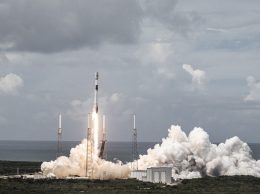Dubroff: Middle East tensions, space race boon for Central Coast bases
Working at an inner city high school in the late 1970s, I learned a few things about street fights. One of them was this: if you are walking in a hostile neighborhood and rocks start hitting the pavement behind you, keep walking. The people tossing the rocks are aiming to miss.
That appears to be Wall Street’s response to rising tensions in the Middle East, where the killing of Iran’s top commander by U.S. forces was met with a response by Iranians that included a missile attack on U.S. installations in Iraq that likely was designed to minimize damage.
Closer to home, there are broader economic lessons about the future of the military bases on the Central Coast and about the future for regional stocks, which had a spectacular year in 2019.
When it comes to military bases, the Trump administration’s decision to suspend the intermediate range missile treaty has triggered new activity at both Vandenberg Air Force Base and Naval Base Ventura County.
The announcement of a Space Force center at Vandenberg comes as SpaceX and others are standing up commercial launch activities at Vandenberg. But as global tensions rise, the role of Vandenberg for weapons testing and space defense has become elevated.
Naval Base Ventura County’s future, once in doubt amid Pentagon budget cuts, is not any longer on the table. Its warfare test centers and the test range off San Nicolas Island are seen as crucial as the Pentagon tries out a new generation of longer range weapons and, if it hasn’t done so already, moves to match and, if possible, defeat Russia’s new fleet of hypersonic vehicles.
It is not just Russia and the threat of Iran and the Middle East that the U.S. must worry about. Until recent weeks, it was threats from North Korea and possibly China that were at the top of the international crisis agenda. The fact that threats can change so quickly is another reason why NBVC and Vandenberg are now viewed as such crucial assets.
When it comes to markets, however, there is a kind of play book for international crises that seems to be baked into a mindset that values stability over everything else.
“We have seen these movies before,” said Todd Lowenstein, managing director and chief equity strategist at High Mark Capital Management in Santa Barbara.
“There is disruption in the short term…and then back to the trajectory,” he said. The pattern spans five decades from the Cuban missile crisis to two Gulf Wars to Russia invading Crimea in 2014.
But in the 2000s, the Central Coast is a much larger participant in the stock markets, with a larger lineup of technology and life science companies that, at least according to the UCSB-Business Times Index, delivered a total return of 37.93 percent, or about 7 percentage points above the S&P 500 and slightly higher than the Nasdaq index.
Lowenstein said the performance of area stocks – including strong gains by The Trade Desk, Appfolio and Teledyne — was not surprising because 2019 was a year in which “everybody got a trophy,” despite the absence of a solid gain for corporate profits.
“Given the big move we had last year, we need a restoration of earnings growth to validate the move,” he said, adding that 2019 was marked by jitters over a temporary inversion of the yield curve and an actual recession in manufacturing.
The markets’ remarkable resilience in the face of geopolitical tensions and political uncertainty is notable and Lowenstein is not alone in noting that people who “sold because of Obama or sold because of Trump” made equally poor decisions.
Right now, he said, the markets appear to be “priced for a goldilocks outcome” of low inflation, slow but steady growth and no major disruptions in trade or geopolitics despite heated rhetoric. As with many things related to the economy, Lowenstein is still looking at the Federal Reserve which has been cutting interest rates and expanding its balance sheet recently. More than a decade after the Great Recession “that’s still not the norm,” he said.
• Contact Editor Henry Dubroff at [email protected].











